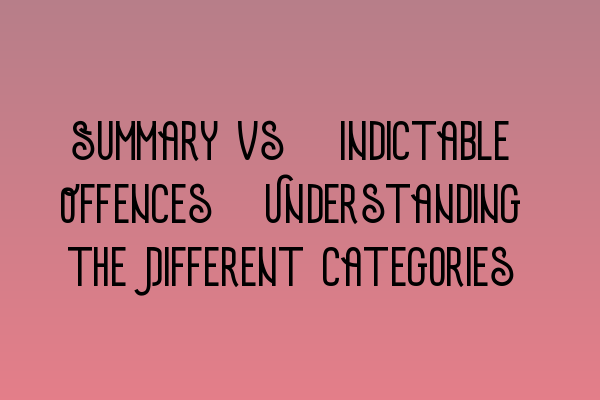Summary vs. Indictable Offences: Understanding the Different Categories
When it comes to criminal law in the UK, offences are divided into different categories based on their severity and the procedure followed during a trial. The two main categories of offences are summary offences and indictable offences. Understanding the differences between these categories is crucial for both legal professionals and individuals involved in the criminal justice system.
Summary Offences
Summary offences, also known as minor offences, are less severe crimes that are usually heard and decided by a magistrate or judge alone, without a jury. These offences are typically less complex and carry lesser penalties compared to indictable offences.
In summary trials, the focus is on expediency and efficiency. The trial process is relatively quick, and the aim is to resolve the case promptly. Common examples of summary offences include petty theft, criminal damage, and minor assault.
Indictable Offences
Indictable offences are more serious crimes that are typically heard and decided by a judge and jury in the Crown Court. These offences generally carry longer prison sentences and require a more detailed and extensive trial process.
The trial for an indictable offence involves presenting evidence, examination of witnesses, and cross-examination. Both the prosecution and the defence can present their arguments before the jury makes a decision. Examples of indictable offences include burglary, murder, and fraud.
It is important to note that some indictable offences may be heard summarily in certain circumstances, which is known as a ‘triable either way’ offence. In such cases, the defendant can choose whether to have the case heard in a magistrates’ court or the Crown Court.
Key Differences
To summarize, the key differences between summary offences and indictable offences are:
- Severity: Summary offences are less severe, while indictable offences are more serious.
- Trial Process: Summary offences are usually heard by a magistrate or judge alone, while indictable offences are heard by a judge and jury.
- Penalties: Summary offences carry lesser penalties compared to indictable offences.
- Complexity: Summary offences are generally less complex, while indictable offences require a more detailed trial process.
Conclusion
Understanding the distinction between summary offences and indictable offences is essential for navigating the criminal justice system in the UK. Legal professionals, defendants, and individuals involved in criminal proceedings should be aware of the different categories and their respective procedures. If you require legal representation or further guidance on criminal law matters, SQE Criminal Law & Practice Law UK can provide expert advice and assistance.
For more information on related topics, please see the following articles:
- Legal Representation for Delaware LLCs in the UK: Expert Advice
- Ensuring Ethical Business Practices: Delaware’s Code of Conduct
- Legal Challenges for UK Businesses in the U.S.: Strategies for Overcoming Hurdles
- UK Criminal Law: An In-Depth Analysis of the British Legal System
- Legal Challenges for UK Businesses in the U.S.: Strategies for Overcoming Hurdles
